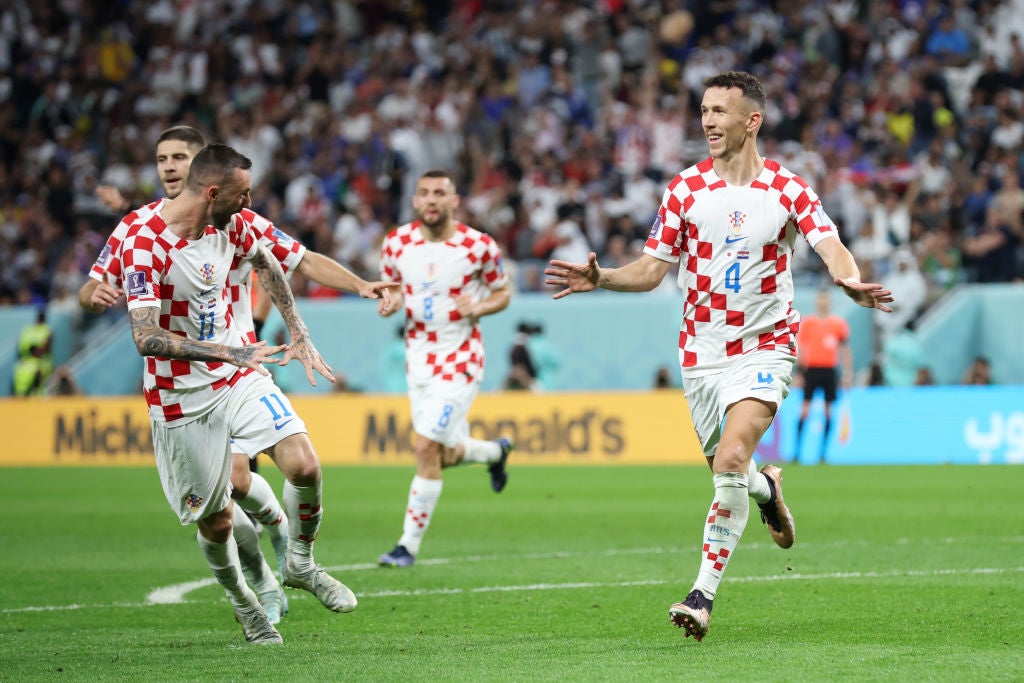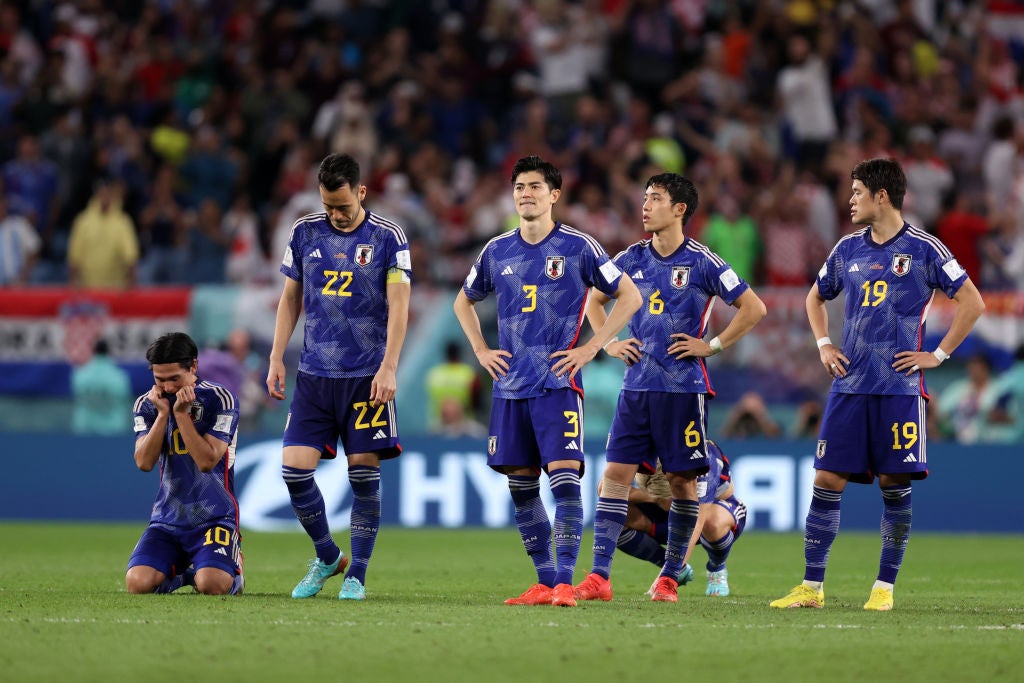Croatia shatter Japan’s World Cup dream as experience proves key in penalty shootout
Japan 1-1 Croatia (Croatia win 3-1 on penalties): Goalkeeper Dominik Livakovic saved three spot-kicks as the 2018 finalists marched on to the last eight in Qatar
Japan had cut down two former World Cup winners but the 2018 finalists ended their run as the scourge of the European powers. The Blue Samarai were the conquerors of Germany and Spain but were denied a third major scalp by a hat-trick of penalty saves from Dominik Livakovic.
In an extraordinary display, the Croatian goalkeeper guessed right three times out of four, denying Takumi Minamino, Kaoru Mitoma and finally Maya Yoshida to extend the World Cup career of Luka Modric. Croatia’s captain had gone off before the first shootout of the 2022 tournament. In his absence, Nikola Vlasic, Marcelo Brozovic and Mario Pasalic all converted, rendering Marko Livaja’s miss irrelevant and ensuring the Dinamo Zagreb goalkeeper was the hero. Only his compatriot Danijel Subasic and Portugal’s Ricardo had ever made three saves in a World Cup penalty shootout before.
If Croatia can savour shootouts, Japan must dread them. Zlatko Dalic’s team had twice prevailed on penalties in their run to the final in 2018. For Japan, as in 2010, a last-16 tie was decided on spot kicks. They have still never reached a World Cup quarter-final and can rue the way they lost an advantage they gained in an excellent first half.
This was the battle of the comeback kings, with Croatia showing an ability to respond to going behind that they had displayed throughout the knockout stages in the 2018 tournament and Japan having turned deficits into advantages against Germany and Spain, but it was Dalic’s side who emerged stronger after the interval, and finished well from 12 yards.
For Japan, who were accustomed to chasing, the game had an unusual scenario. They led. They had something to lose, and ultimately they lost. They could not reel in the favourites; instead, they can merely reflect they looked better than one of the established powers for swathes of the game. Japan were superior before the break, Croatia after. The younger, more energetic side began brighter before the more experienced brigade clawed their way back into it.
They did so thanks to a talisman. Ivan Perisic was a driving force in an improved second-half display, with greater urgency. Croatia’s only goals this tournament had been against Canada but, for the third successive World Cup, Perisic found the net. A feat matched only by Cristiano Ronaldo, Lionel Messi and Xherdan Shaqiri.
Creativity came from an unlikely quarter, Dejan Lovren getting an assist in open play. His cross was curled invitingly but Perisic’s bullet header from 12 yards was outstanding. It was an illustration of the kind of aerial ability few wingers possess. A scorer in the semi-final and final four years ago, it showed Perisic has not lost his knack for delivering big goals.
He might have had a goal earlier, with Shuichi Gonda blocking a shot after he robbed Takehiro Tomiyasu, but his equaliser could have led to a second for Croatia. Modric connected sweetly with a flying volley that drew an athletic save from Gonda. The substitute Ante Budimir headed just wide. An increasingly rampant Perisic had a crisp strike deflected just wide by Tomiyasu. Yet in extra time, only Lovro Majer, with a 120th-minute shot into the advertising hoardings, came remotely close.

Nor did Japan really threaten to restore their lead. Livakovic had to tip over a long-range shot from the impressive Wataru Endo, but otherwise, theirs was a muted response. Hajime Moriyasu, the master of substitutions in the group stages, turned to Mitoma and Takuma Asano, two of those who have made an impact from the bench, amid a flurry of changes. This time his magic touch deserted him. Mitoma had one inspired run in the 105th minute but directed his shot at Livakovic, just as he could not beat the keeper in the shootout.
The match petered out into penalties, whereas Japan began at pace. They had beaten Spain with just 17 per cent of the ball but, while still having a minority share, enjoyed more possession and displayed ambition as Ritsu Doan proved he is more than just a super sub. A scorer against Germany and Spain was promoted to start, adopted a roving brief and exerted an impact. He was a reason for their swift start, though perhaps in promoting Doan, Japan cost themselves a game-changer from the bench.
They ought to have lead in the second minute when Shogo Taniguchi glanced a header wide. At the end of a terrific move, Daichi Kamada skied a shot after Doan found him. They had a threat on the break, invariably involving Junya Ito and his crossing.

They took a deserved lead, Daizen Maeda reacting fastest to finish emphatically when Ritsu Doan’s cross was met by Taniguchi, who turned it back across the six-yard box. Taniguchi was onside by the slenderest of margins and it was just Maeda’s second international goal, but a reward for the series of shifts he has put in alone up front this tournament for a team who have often played without the ball. They symbolic moment of his first half may have been when Maeda left the usually immaculate Modric on his backside.
Yet, in the end, it was Modric who remained in the tournament. Japan, engineers of two of the great shocks, endearing overachievers, nevertheless met a familiar fate. They lost in the last 16 again.




Join our commenting forum
Join thought-provoking conversations, follow other Independent readers and see their replies
Comments